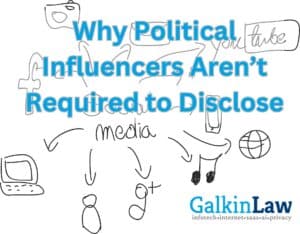
In the era of social media, influencers have become powerful voices shaping public opinion on everything from lifestyle tips to the latest election campaigns. But a recent shift in how campaigns leverage influencers has raised an intriguing question: why don’t influencers have to disclose paid endorsements for political candidates? Unlike the FTC’s strict rules requiring influencers to disclose paid commercial promotions, political endorsements fall into a regulatory gap. This post explores why this gap exists, how it influences voters, and whether disclosure rules for political endorsements are necessary.
The FTC vs. FEC: What’s the Difference?
The Federal Trade Commission (FTC) and the Federal Election Commission (FEC) each regulate different types of content on social media. The FTC oversees commercial transactions, which means if an influencer is paid to promote a product or brand, they must disclose it with labels like #ad or #sponsored. The goal here is transparency—consumers have a right to know when someone is financially motivated to endorse a product.
However, when it comes to political endorsements, the FTC’s role ends, and the FEC steps in. But unlike the FTC, the FEC doesn’t require influencers who are paid to support candidates or political issues to disclose these financial ties. The FEC regulates paid political communications in traditional media, like TV, radio, and physical mailers, where disclosures like “paid for by” are legally required. Social media, however, operates in a gray area. Because social media endorsements from influencers are not technically “public communications” in the FEC’s view, they fall outside of the FEC’s rules on transparency.
Why Political Endorsements Lack Disclosure
The primary reason for this regulatory gap is that the FTC’s mandate covers commerce only. Because supporting a candidate doesn’t directly qualify as a commercial transaction, it doesn’t fall within the FTC’s purview. On the other hand, the FEC has chosen not to extend disclosure requirements to influencers on social media. Last year, the FEC declined a proposal that would have required social media influencers to disclose payments for political endorsements, citing the difficulty of regulating “individual” endorsements and the need for flexibility in new forms of political engagement.
However, two FEC commissioners who supported the proposal argued that the public should know when influencers are being paid to promote a political message. In their view, paid endorsements on social media are no less influential than traditional political ads and should be subject to the same transparency standards.
The Implications for Voters
This lack of disclosure can make it difficult for voters to differentiate between genuine support and paid endorsements. In an environment where many young voters primarily consume news through social media, influencers hold significant sway. Their endorsements can feel personal and trustworthy, blurring the line between genuine opinion and sponsored content. And with influencers on both sides of the political spectrum endorsing candidates, voters may struggle to tell which posts reflect personal beliefs versus paid support.
Without clear labeling, users may believe these endorsements are organic, authentic opinions rather than paid messages. This can lead to a “hidden persuasion” effect, where the trust followers place in influencers translates into support for candidates, without knowing there’s a financial incentive behind the endorsement.
#InfluencerMarketing #Election2024 #Transparency #SocialMedia #PoliticalAdvertising
